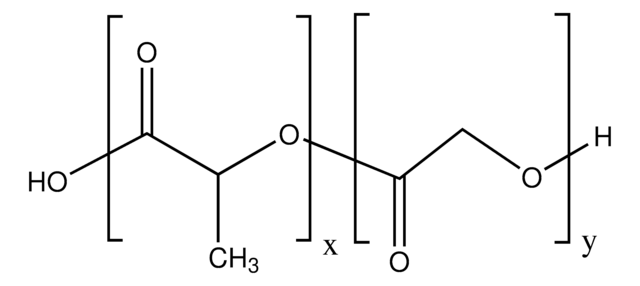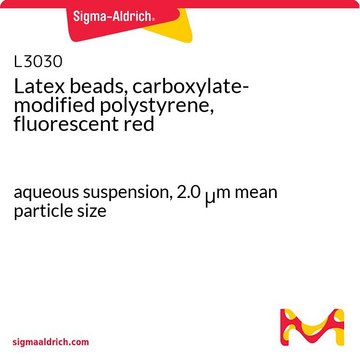805173
Green Fluorescent PLGA microspheres
25 μm average diameter
Synonym(s):
Green Fluorescent PLGA nanoparticles, Degradex® Fluorescent PLGA
About This Item
Recommended Products
description
Excitation/emission: 460/500 nm
Quality Level
form
powder
average diameter
25 μm
density
1.3 g/cm3
shipped in
wet ice
storage temp.
−20°C
Looking for similar products? Visit Product Comparison Guide
General description
To re-constitute:
- Remove the product from freezer
- Wait until temperature rises to the ambient temperature
- Add DI water or buffer to the container
- Vortex and sonicate for 5 minutes to ensure the microspheres are well suspended.
Application
Legal Information
Storage Class Code
11 - Combustible Solids
WGK
WGK 3
Flash Point(F)
Not applicable
Flash Point(C)
Not applicable
Choose from one of the most recent versions:
Certificates of Analysis (COA)
Don't see the Right Version?
If you require a particular version, you can look up a specific certificate by the Lot or Batch number.
Already Own This Product?
Find documentation for the products that you have recently purchased in the Document Library.
Articles
Study on how Degradex® PLGA microspheres and nanoparticles can be used for drug delivery research and formulation development.
Polymeric antioxidants are promising and effective new-generation antioxidant therapies. With flexibility of form as well as prolonged stability and circulation, these nanobiomaterials have superior bioavailability for drug delivery and antioxidant potential.
Biomaterials science involves the design and fabrication of smart materials for studying, directing, or mimicking biology. For successful integration of biomaterials in biological research, a meaningful understanding of biological systems is required.
Our team of scientists has experience in all areas of research including Life Science, Material Science, Chemical Synthesis, Chromatography, Analytical and many others.
Contact Technical Service






